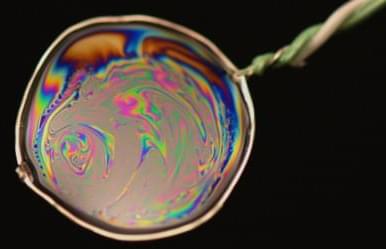Bubbles are ubiquitous, existing in everything from the foam on a beer to party toys for children. Despite this pervasiveness, there are open questions on the behavior of bubbles, such as why some bubbles are more resistant to bursting than others. Now Francois Boulogne and colleagues from the University of Paris-Saclay have taken a step toward answering that question by measuring the temperature of the film surrounding a soap bubble, finding that it can be significantly lower than that of its local environment [1]. The team says that the result could help industrial manufacturers of bubbles better control the stability of their products.
On a sunny day, our bodies cool down by releasing energy into the environment through the evaporation of sweat. Soap films also release energy by losing liquid via evaporation. Researchers studying bubbles have tracked the evaporation of a soap film’s liquid content under different conditions. But those experiments all assumed that the film’s temperature matched that of the environment, an assumption the results of Boulogne and his colleagues challenge.
In their experiments Boulogne and colleagues created a soap bubble from a mixture made of dishwashing liquid, water, and glycerol. They then measured the soap film’s temperature under a variety of environmental conditions. They found that the film could be up to 8 °C colder than the surrounding air. They also found that glycerol content of the soap film impacted this temperature difference, with films containing more glycerol having higher temperatures. Boulogne says that such a large temperature difference could impact bubble stability. But, he adds, further experiments are needed to corroborate that idea.
